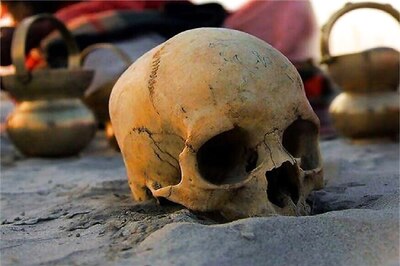
views
New Delhi: The Chinese used to think a dragon was eating up the sun and Indians stand neck deep in water expressing solidarity with the sun.
A solar eclipse brings the world together, in fear, if nothing else.
There's a solar eclipse scheduled for March 29 and tourists and scientists are gathering at spots around the world for the spectacular solar show.
The first total eclipse in years will sweep northeast from Brazil to Mongolia, blotting out the sun.
Wednesday's eclipse will also blot out the sun in highly populated areas, including west Africa, where governments scrambled to educate people about the dangers of looking at the eclipse without proper eye protection.
There have been several popular superstitions attached with the eclipse and have been passed down the generations.
In India too, there are some myths attached to the eclipse.
Pregnant women are advised not to go outside during the eclipse to avoid having a blind baby or one with a cleft lip.
It is also suggested that food cooked before the eclipse should be thrown out afterward as it becomes impure.
Another interesting story attached with the eclipse is that those who are holding a knife or axe or any other sharp instrumet during the eclipse will cut themselves.
The moon is expected to first begin blocking out the sun in the morning in Brazil before the path of greatest blockage migrates to Africa, then on to Turkey and up into Mongolia, where it will fade out with the sunset.
Most parts of north India will see a partial eclipse between 1630 hrs (IST) and 1830 hrs (IST) on Wednesday.
PAGE_BREAK
In Togo, authorities imported hundreds of thousands of pairs of special glasses that consumers cleared rapidly from shelves in the capital, Lome. But villagers in the interior won't have access to the eyewear and officials called on them to stay home.
"Please, do not go out and keep your children indoors on solar eclipse day,"
Togo's minister for health said in a message broadcast on state television.
Night will turn to day in the eclipse's route and a corona will glow around the edges of the moon as it comes between the earth and the sun. But the corona's light can burn eyes.
In Ghana, where the effect will be particularly visible, people were spending about $1 for "solar shades" -- paper-rimmed glasses with dark plastic lenses that resemble eyewear used for viewing three-dimensional movies.
Crowds were anticipated in prime viewing points, among them Accra, the capital of Ghana, and in Turkey and India. In Ghana, the University of Cape Coast will broadcast the eclipse simultaneously on the Internet.
Tens of thousands of tourists were expected along the Turkish Mediterranean coast.
Astronomers from NASA and Britain's Royal Institute of Astronomy also were going to an ancient Roman amphitheater in Turkey to view the phenomenon.
(With inputs from AP)




















Comments
0 comment